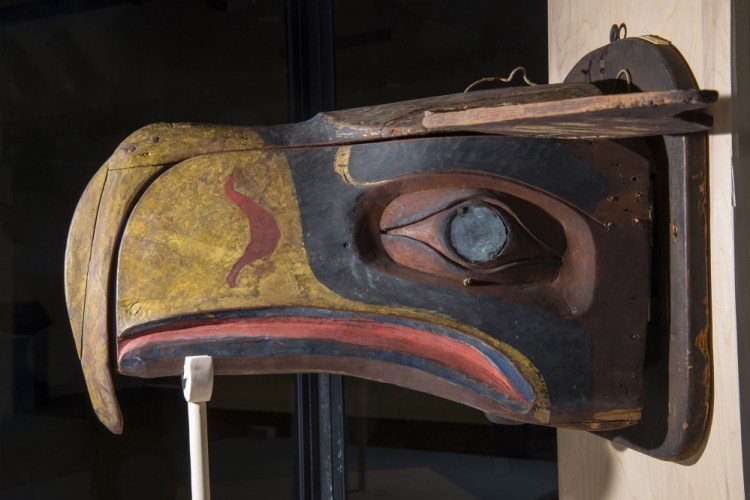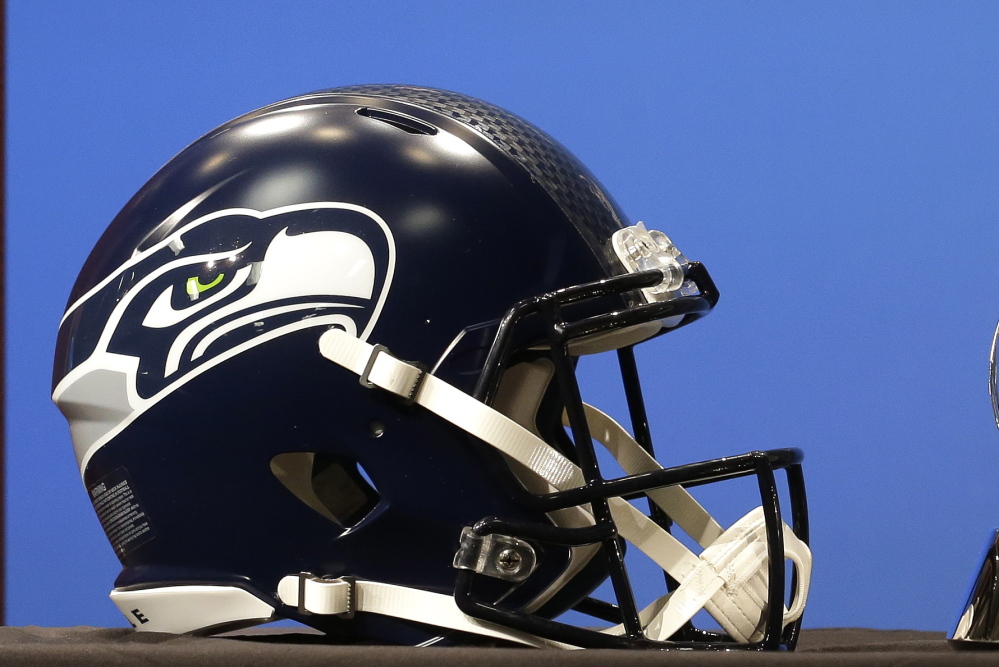If the New England Patriots lose to the Seattle Seahawks in the Super Bowl on Feb. 1, the fault may not lie with coach Bill Belichick or quarterback Tom Brady or with how much air pressure is in the football.
The fault may be Gretchen Faulkner’s.
Let us explain.
Faulkner is the longtime director of the University of Maine’s Hudson Museum, which features an extensive collection of artifacts detailing Native American history.
Among the hundreds of items in the collection is a hand-carved wooden mask – a transformation mask – that originated from the Kwakwaka’wakw (pronounced kwok KWOCK-y wock) tribe, native to the Pacific Northwest.
A transformation mask has the appearance of an animal when it is closed, and reveals a human face when opened. The masks were commonly used in ritual dances.
The mask in the Hudson Museum’s collection does indeed resemble a human face when opened. When closed, it depicts a bird of prey that looks unmistakably like the logo for – you guessed it – the Seattle Seahawks.
Faulkner was told years ago by Hudson Museum founder and UMaine anthropologist Richard Emerick that the mask was the inspiration for the logo, which was introduced in 1975 after Seattle was granted an NFL franchise. But Emerick had no documentation to back the claim up.
The mask was donated to the Hudson Museum by the late Falmouth resident and collector William Palmer, along with a host of other Native American artifacts, but Palmer had no documentation for the mask’s origin either, Faulkner said.
The mask was exhibited at the Hudson Museum beginning in 1986 and was always displayed in the open setting that resembles a human face.
Every once in a while, though, Faulkner would tell a visitor that the mask was used to create the Seahawks logo. The original Seahawks logo was altered slightly in 2002 and again in 2012, making the bird’s appearance more menacing and less like the mask.
Faulkner said that whenever she mentioned the link, people were skeptical.
SUSPICIONS CONFIRMED
In February 2014, not long after Seattle won its first Super Bowl, a 43-8 rout of the Denver Broncos, Faulkner and one of the museum’s board members, Isla Baldwin, thought the time might be right to see if they could prove that the mask in their collection was the inspiration for the fearsome Seahawks logo that had begun to show up everywhere.
Baldwin did some research and stumbled across a blog post written by Robin K. Wright, curator of Native American art at the Burke Museum of Natural History and Culture at the University of Washington in Seattle.
Wright confirmed that the inspiration for the logo came from a photograph of a Kwakwaka’wakw transformation mask included in the 1950 book “Art of the Northwest Coast Indians.”
The mask in the photo is the mask owned by the Hudson Museum.
“We always knew about the photo, but we didn’t know where the mask itself was,” said Katie Bunn-Marcuse, another curator at the museum in Seattle.
When Faulkner contacted her counterparts in Seattle, it happened that Bunn-Marcuse was preparing a new exhibit at the Burke Museum called “Here and Now: Native Artists Inspired.” She wondered, could she borrow the mask?
Faulkner said sure. Museums often loan items to other museums. “And we thought it made sense for people in Seattle to see it for themselves,” she said.
It took a while to set up the loan, but the mask was unveiled at the Seattle museum Nov. 18.
Faulkner even flew out for the event, in which members of the Kwakwaka’wakw tribe blessed the mask, and former Seahawks including quarterback Jim Zorn made an appearance.
“The exhibit is all about how older objects inspire new creations, so this fits right in,” Bunn-Marcuse said. “And people have come into the museum who might not have otherwise.”
UNVEILING, THEN WINNING
Things have gotten interesting for the Seahawks since that unveiling in November.
Two days earlier, the Seahawks had lost to the Kansas City Chiefs, falling to 6-4 on the season. Fans and sports analysts questioned whether this team was as strong as the one that had won the Super Bowl nine months earlier.
But since the mask was unveiled in its native Pacific Northwest, the Seahawks haven’t lost a game.
They won their six remaining regular-season games by an average score of 22-7, then beat the Carolina Panthers in the divisional round and the Green Bay Packers in the NFC championship game Sunday.
Now, they’ll see how far the mask’s good luck will carry them: They defend their Super Bowl title Feb. 1 against the New England Patriots.
Faulkner, who has Patriots gear in her office and is rooting for the Pats, can’t help but chuckle at the cosmic possibility that she may have inadvertently helped her team’s opponent.
But she said the Patriots also have done pretty well since mid-November.
“May the best team win,” she said.
Bunn-Marcuse couldn’t ascribe any magical abilities to a mask.
“But I love the excitement around the cultural connection,” she said. “What are we going to do when we have to give the mask back?”
Faulkner noted another coincidence involving the mask and the state of Arizona, which will host this year’s Super Bowl: Before the mask was acquired by William Palmer, it was part of a collection owned by the renowned surrealist painter and sculptor Max Ernst, who lived for many years in Sedona.
There is a lot riding on the Super Bowl.
The Seahawks, of course, are seeking to win back-to-back championships. The last team to do that? The New England Patriots, in 2004 and 2005.
SEAFOOD DINNER AT STAKE
The Patriots, meanwhile, haven’t won a Super Bowl since 2005, but have come close twice, in 2008 and 2012, losing both times to the New York Giants. They are hoping to cement their status as the NFL’s most successful franchise early in the 21st century and shake off persistent allegations of cheating, the most recent of which involves whether they used improperly inflated footballs in their AFC championship game victory.
The Super Bowl’s outcome also matters to the two museums’ staffs.
If New England wins, Wright owes Faulkner a Dungeness crab dinner from Seattle.
If the Seahawks win, Faulkner will ship Wright a Maine lobster dinner.
Send questions/comments to the editors.





Success. Please wait for the page to reload. If the page does not reload within 5 seconds, please refresh the page.
Enter your email and password to access comments.
Hi, to comment on stories you must . This profile is in addition to your subscription and website login.
Already have a commenting profile? .
Invalid username/password.
Please check your email to confirm and complete your registration.
Only subscribers are eligible to post comments. Please subscribe or login first for digital access. Here’s why.
Use the form below to reset your password. When you've submitted your account email, we will send an email with a reset code.